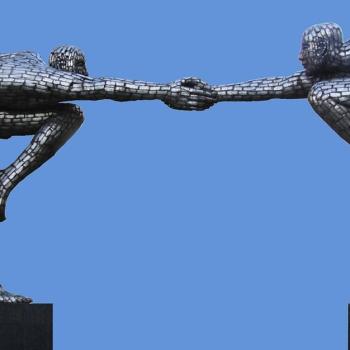N.T. Wright's How God Became King: The Forgotten Story of the Gospels claims that Christians have downsized the true story of the Gospels—the tale of God finally becoming king of the world—into a simple how-to guide for personal salvation. For Wright, a retired Anglican Bishop and current Research Professor of New Testament and Early Christianity at St. Mary's College, University of St. Andrews in Scotland, the Gospels tell a story even bigger than the birth and death of Jesus—they reveal what the world is supposed to look like when God is in charge.
How God Became King calls for a reading of the Gospels that focuses on this bigger story. We asked Wright more about his book and what this reading means for today's church.
You worry that for too long churches have emphasized Jesus' birth and death while overlooking his life. But of course, most every Sunday, pastors teach the parables and other episodes from Jesus' life. What are they missing?
Having preached for most of my adult life, I've only recently clarified this in my own mind. It doesn't mean that everything the church has said or is saying is wrong. It just means that there's a radical element that has not been there.
Many people go to the Gospels expecting to find teachings about how to live a good Christian life or how to be converted. Some of the stories of Jesus meeting people and dealing with people can be applied from the pulpit to you. You need to meet Jesus and you need to repent of your sins and this is how it's going to happen for you. Likewise, a lot of the stuff in the Gospels can be directly translated into how we should behave as Christians. That's all there. But it's framed within a much larger concern.
Jesus is not simply teaching us how to believe a bit better or behave a bit better. He is actually announcing that something is happening which is changing the way the world is. In the stories of Jesus' life, you have those two things: a) yes, this world really does matter to God, and b) he's now taking control of it, even though that doesn't look like what we might have imagined.
It's important to think about not only what happens in the story, but also where the story begins. Many Christians tell their story as if it begins in Genesis 3 with a fallen humankind. You stress that it begins in Genesis 1 with a creator God fashioning a good world.
Yes, that's right. Sadly, the short version of the story is: we're all sinners and God sent Jesus. Oh, by the way, there's some Old Testament prophecies to back it up, so it's all right now, isn't it?
Better to have that story than none, but the full story is God made this wonderful world and made human beings to run it. Humans are there to run God's world for him, that's part of the deal. But then, the humans rebel, so that the running of the world becomes problematic. This is why, when you get this big of a picture, you're bound eventually to get to political theology. The question of how humans run the world is built into the narrative from the beginning. It's because we tell the story in the shrunken way that you just graphically described that we then have problems later on.
If the gospel narratives describe God finally becoming king of his world, we still have a problem—he doesn't often seem to be a very involved ruler or to be running a very peaceful kingdom. Is he a king in the mold of today's British monarchy, more ceremonial than actual?
The irony is the Gospels are written to answer this question. People are expecting that God is going to send in the troops, but Jesus is saying God becomes king in the same way he wanted creation itself to work in the beginning—by seeds being sown. This is what God's kingdom is like. It's like a woman who loses a coin and finds it again. It's like a shepherd looking for sheep. It's not like clearing out the sheep over night and getting a new lot who will never ever get lost.
In the first three centuries, when the Romans were persecuting [the church] beyond belief, people still went on becoming Christians because the church was out there doing stuff. They were caring for people by looking after the poor and the lonely and the elderly. People were just flabbergasted because they had never seen anything like this before. Nobody had ever looked after, or educated, or cared for people other than their own kin or immediate special interest groups. The thought that there was a community that was just going around doing good—especially to the poor—just freaked people out.
What we've forgotten in the West—because it's in the interest of post-Enlightenment Western society to forget it—is that the church has actually radically transformed the world. For example, most of the great hospitals and educational institutions have been started by Christians . . . that's the kind of stuff the church does. These are signposts of the kingdom. This isn't bringing the kingdom in all its fullness. Only God will do that in God's good time. But God has begun to do it through Jesus, and he's continuing to do it through the Spirit.





